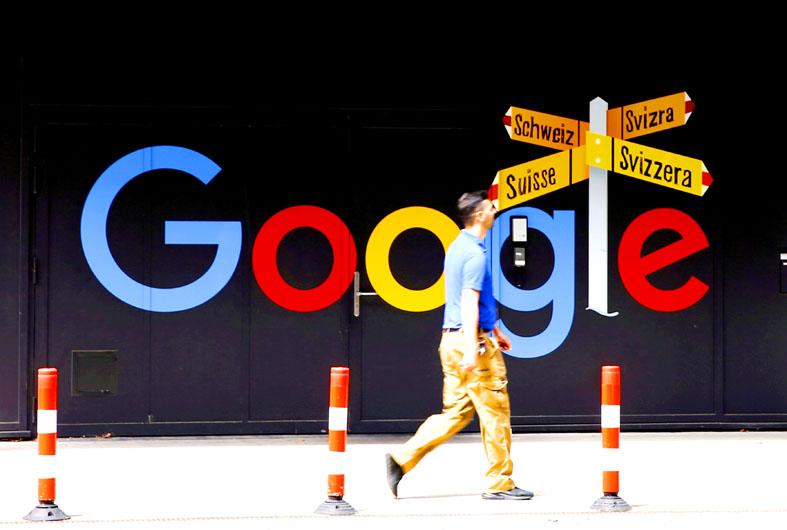Google parent Alphabet Inc on Tuesday reported that quarterly profit more than doubled as digital advertising surged with more people relying on the Internet during the COVID-19 pandemic.
Profit in the first quarter leaped to US$17.9 billion from US$6.8 billion in the same period a year earlier, while revenue jumped 34 percent to US$55.3 billion, led by gains in advertising and cloud computing services.
“Over the last year, people have turned to Google Search and many online services to stay informed, connected and entertained,” Alphabet chief executive officer Sundar Pichai said.

Photo: Reuters
The Silicon Valley giant reported robust gains from advertising on its search engine and its YouTube video-sharing platform.
“People have turned to Google Search more than ever since the pandemic began,” Pichai said on an earnings call, adding that queries ran a gamut from COVID-19 questions to job hunts.
While the pandemic has brought tremendous challenges for small businesses, it has also created opportunities for entrepreneurs to tailor offerings for new trends, Google chief business officer Philipp Schindler said.
“Consumers are spending more time online. They’re buying more online, and they were willing to try new brands and eager to support local businesses,” Schindler said on the call.
Money taken in by Google’s cloud computing division, which competes with services offered by Amazon.com Inc and Microsoft Corp, topped US$4 billion, up from US$2.7 billion in the same period a year earlier, as Alphabet continues to invest heavily in data centers and other infrastructure.
“Our cloud services are helping businesses, big and small, accelerate their digital transformations,” Pichai said.
Amazon Web Services is the top cloud service provider, with nearly one-third market share, data provided by industry tracker Canalys showed.
Microsoft’s Azure platform is on the heels of Amazon, while Google is a distant third, Canalys said in a market report.
Microsoft on Tuesday reported that profits rose sharply last quarter amid strong momentum in cloud services for businesses.
Profits jumped 44 percent from the same period a year earlier to US$15.5 billion, while revenue increased 19 percent to US$41.7 billion, it said.
The results showed ongoing momentum for Microsoft as it focuses on services for enterprises in the Internet cloud, which has become more critical during the global health crisis of the past year.
“Over a year into the pandemic, digital adoption curves aren’t slowing down. They’re accelerating, and it’s just the beginning,” Microsoft chief executive officer Satya Nadella said. “We are building the cloud for the next decade, expanding our addressable market and innovating across every layer of the tech stack to help our customers be resilient and transform.”
Microsoft said its commercial cloud revenue increased 33 percent in its fiscal third quarter as part of the growing trend.
It reported strong gains in its Office suite of products and a more modest increase in similar software and services for consumers.
Microsoft posted revenue increases across a range of products and services, including its Xbox gaming content and services (34 percent), search advertising (17 percent), the LinkedIn professional social network (25 percent) and its Surface line of computing products (12 percent).
The surging market for PCs helped drive revenue for the Windows operating system up 10 percent year-on-year, with a similar increase in Windows commercial products and cloud services.

South Korea’s equity benchmark yesterday crossed a new milestone just a month after surpassing the once-unthinkable 5,000 mark as surging global memory demand powers the country’s biggest chipmakers. The KOSPI advanced as much as 2.6 percent to a record 6,123, with Samsung Electronics Co and SK Hynix Inc each gaining more than 2 percent. With the benchmark now up 45 percent this year, South Korea’s stock market capitalization has also moved past France’s, following last month’s overtaking of Germany’s. Long overlooked by foreign funds, despite being undervalued, South Korean stocks have now emerged as clear winners in the global market. The so-called “artificial intelligence

NEW IDENTITY: Known for its software, India has expanded into hardware, with its semiconductor industry growing from US$38bn in 2023 to US$45bn to US$50bn India on Saturday inaugurated its first semiconductor assembly and test facility, a milestone in the government’s push to reduce dependence on foreign chipmakers and stake a claim in a sector dominated by China. Indian Prime Minister Narendra Modi opened US firm Micron Technology Inc’s semiconductor assembly, test and packaging unit in his home state of Gujarat, hailing the “dawn of a new era” for India’s technology ambitions. “When young Indians look back in the future, they will see this decade as the turning point in our tech future,” Modi told the event, which was broadcast on his YouTube channel. The plant would convert

‘SEISMIC SHIFT’: The researcher forecast there would be about 1.1 billion mobile shipments this year, down from 1.26 billion the prior year and erasing years of gains The global smartphone market is expected to contract 12.9 percent this year due to the unprecedented memorychip shortage, marking “a crisis like no other,” researcher International Data Corp (IDC) said. The new forecast, a dramatic revision down from earlier estimates, gives the latest accounting of the ongoing memory crunch that is affecting every corner of the electronics industry. The demand for advanced memory to power artificial intelligence (AI) tasks has drained global supply until well into next year and jeopardizes the business model of many smartphone makers. IDC forecast about 1.1 billion mobile shipments this year, down from 1.26 billion the prior

People stand in a Pokemon store in Tokyo on Thursday. One of the world highest-grossing franchises is celebrated its 30th anniversary yesterday.